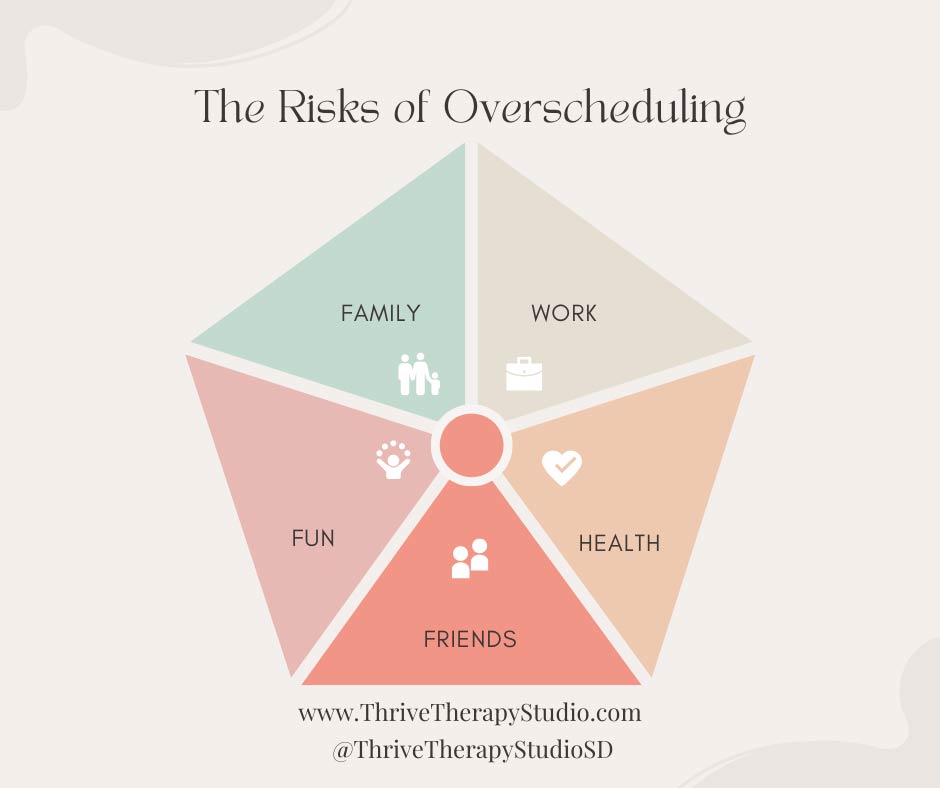As I shared last week in my blog post about overscheduling, I have been thinking a lot about overscheduling as we adjust to the back-to-school phase. So often, our kids have jam-packed schedules filled with numerous extracurricular activities, tutoring sessions, and academic pursuits. While exposing kids to various experiences can be beneficial, overscheduling can take a toll on their physical and emotional well-being. As parents, it’s crucial to strike a balance between offering enriching opportunities and allowing ample time for unstructured play and relaxation. In this blog post, I will share some of the risks associated with overscheduled children and the importance of nurturing balance and well-being in their lives.
So, what on earth could go wrong when you are just trying to provide your children with opportunities?
1. Pressure to Perform: One of the significant downsides of overscheduling is the mounting pressure it places on children to excel in every activity they undertake. Constantly striving for perfection in multiple domains can lead to burnout and stress, causing a negative impact on their mental health and self-esteem.
2. Lack of Time for Unstructured Play: Unstructured play is incredibly important for a child’s cognitive, emotional, and social development. When children are overscheduled, they miss out on the opportunity to engage in imaginative play and explore their interests independently. Such activities are essential for fostering creativity and problem-solving skills.
3. Physical Exhaustion: Overscheduled children often experience physical fatigue due to the demanding nature of their daily routines. Lack of adequate rest and sleep can compromise their immune system and leave them vulnerable to various health issues. A good rule of thumb – if you are exhausted by the daily grind in your family, the odds are that your child is too!
4. Struggling Academically: While extracurricular activities can enhance a child’s skills, excessive commitments may result in fatigue, leaving them with less time and energy to focus on their academic responsibilities. This business can lead to a decline in their academic performance and overall motivation to learn.
5. Less Time for Family: While this one may feel obvious, it does not occur to some families that the more time spent on structured activities, the less time there is to connect with their children at home through more natural activities.
6. Anxiety and Difficulties Regulating Emotions: The pressure to juggle multiple commitments can result in emotional strain and anxiety for overscheduled children. They may feel overwhelmed and struggle to manage their emotions effectively.
7. Missed Opportunities for Self-Discovery: A balanced schedule allows children the time and space to explore different interests and passions. They may miss out on discovering their true passions and strengths when overscheduled.
As parents, it’s essential to evaluate your child’s schedule regularly and make necessary adjustments to maintain balance. Focus on quality over quantity, allowing your child to participate in a few activities they genuinely enjoy and excel at. Invite them to talk with you about what they enjoy and what activities they might want to stop doing. It is a good learning experience for kids and parents to realize that we are not actually able to do “everything.”
Encouraging downtime and rest in your child’s daily routine is also important. Sufficient sleep and relaxation are vital for their physical and mental well-being. How you frame this to them is so important – so make sure to let them know that they need rest just as much as they need activity, school, and food. Let them know that the signals of being tired all the time, not motivated, stressed, etc., are actually signals of needing downtime, just like a check engine light in the car is a sign the car needs some mechanical support! The “check engine light” analogy usually is super helpful in building an understanding of what our bodies need!
I totally understand why parents want to provide their children with so many opportunities – we all truly want the best for our children after all! Learning to strike a balance between enriching experiences and downtime is essential for their overall well-being and development. By nurturing a balanced schedule, we can foster their growth, creativity, and happiness, allowing them to academically and emotionally flourish. Remember that a child’s well-being should always be the top priority, and finding that sweet spot of balance can lead to a healthier and more fulfilling childhood experience.
Reach out to start
your healing journey


